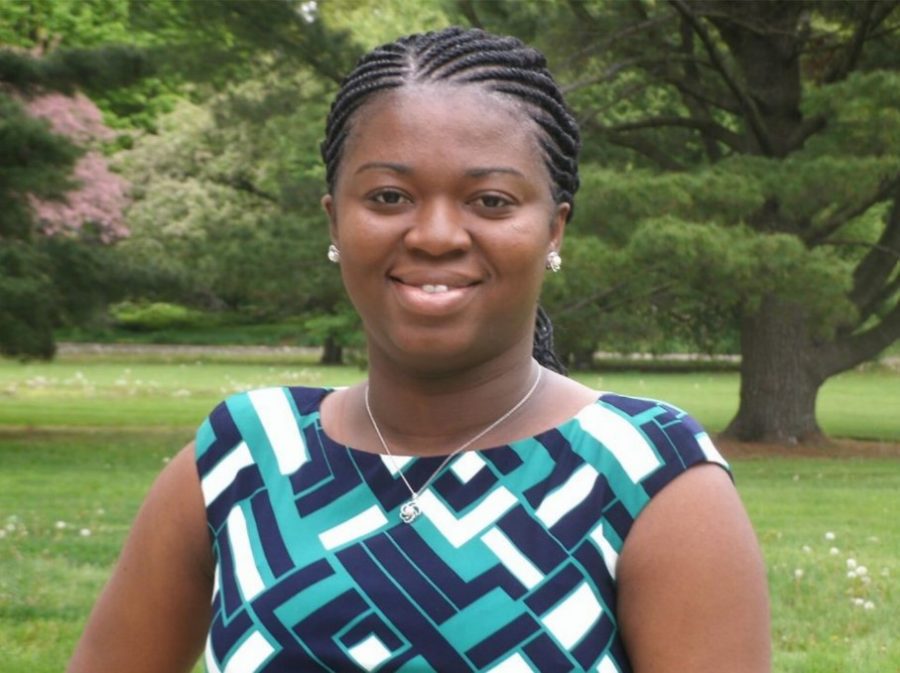Experts weigh in on COVID-19 pandemic
Photo Courtesy of Dr. Sandra Darfour-Oduro
Dr. Sandra Darfour-Oduro poses for a photo in a local park. She encourages people to remain calm and follow preventative measures during the coronavirus pandemic.
March 26, 2020
Dr. Sandra Darfour-Oduro teaches the CHLH 274: Introduction to Epidemiology course within the College of AHS. In this class, she talks to her students about the patterns of diseases, health services administration and health policy. With COVID-19 dramatically affecting the lives of every student at the University, the subject of this class seems more important than ever.
Darfour-Oduro has a background in infectious diseases. Her research focuses on the impact of social environments on disease outcomes and how human behavior could expose people to disease in general. With COVID-19, many people have turned to panicking, which she said is not good for handling the disease.
“It is a novel disease, so we don’t know much,” Darfour-Oduro said. “When there’s something new and we don’t know much about it, there’s always a panic.”
Scientists and doctors have learned the disease is spread through droplets. If an infected person sneezes or coughs and they are interacting with someone else, it could spread the disease further. However, she says research into treatments is still ongoing.
Darfour-Oduro encourages people to follow the preventative measures put in place by officials.
Get The Daily Illini in your inbox!
“Wash your hands regularly with soap and water,” she said. “If you have access to hand sanitizer, use the hand sanitizer. Try not to touch your face, the old and immunocompromised should try to stay at home. All these preventative measures are going to be helpful in minimizing the spread of the virus.”
She commended on Gov. J.B. Pritzker’s stay-at-home order he enacted on Friday. The fact that he spoke with expert epidemiologists and other professionals to inform his policies was encouraging to Darfour-Oduro.
These measures to stop the spread of the virus will be helpful, according to Darfour-Oduro. They will eventually reduce the number of new cases if people follow these orders.
As an expert on the social aspect of diseases, Darfour-Oduro also emphasized the importance of not panicking. She said while those who are immunocompromised may want to stock up on some supplies to minimize the number of times they have to leave their house, others at lower risk do not need to hoard toilet paper.
“I don’t think it’s a good idea to stockpile some of the essentials. If you have them, it’s okay, but you have to think about your neighbor,” Darfour-Oduro said.
She encouraged people to remain calm and follow preventative measures. If someone feels sick, they should call their doctor about their symptoms. It will not help to get scared.
Professor Christopher Brooke is an assistant professor of microbiology whose research also focuses on infectious diseases.
He said he appreciates the efforts the University has gone through to handle this crisis. Putting classes online and limiting meetings and gatherings in a timely manner was an important action. They have taken the issue very seriously and moved rapidly to protect their students and staff.
Above all else, Brooke emphasized the importance of social distancing and quarantine. A vaccine will not be produced for several more months, he said, and we do not have licensed therapeutics that can be utilized in the near future.
Social distancing “is the only tool we have in making the difference between responding to this very effectively and aggressively where everyone takes this seriously and does what they’re supposed to that gives the healthcare system a chance to adapt to the surge of cases,” he said.
If people treat this with a cavalier attitude, they will continue to spread the virus. It will overwhelm the healthcare system, leading to a lack of essential equipment, such as beds or ventilators.
Brooke said it is everyone’s responsibility to do what they can to protect their community. Even young people who were not strongly affected by the disease (though he said in Europe and the United States, that is not the case; young people are battling the infection as well) must consider the impact of their actions on the elderly and immunocompromised.
One fact he wanted people to know was we are not helpless in this.
“We do have the power to affect the outcomes here,” Brooke said.
People can either listen to the recommendations from experts and limit the death and suffering, or they can disregard the facts and create a “total catastrophe,” he said.
Darfour-Oduro also stressed the importance of recognizing misinformation, as the number of those infected with the disease will continue to rise if people do not pay attention and do not respect the advice of experts.
“It’s helpful to get the right information to protect your health and your family,” she said.







